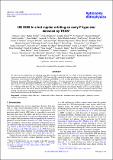| dc.contributor.author | Shporer, Abraham-Avi | |
| dc.contributor.author | Relles, Howard M. | |
| dc.date.accessioned | 2020-06-19T20:31:29Z | |
| dc.date.available | 2020-06-19T20:31:29Z | |
| dc.date.issued | 2019-02 | |
| dc.date.submitted | 2018-11 | |
| dc.identifier.issn | 1432-0746 | |
| dc.identifier.uri | https://hdl.handle.net/1721.1/125895 | |
| dc.description.abstract | We report on the confirmation of a transiting giant planet around the relatively hot (Teff = 6801 ± 76 K) star HD 2685, whose transit signal was detected in Sector 1 data of NASA’s TESS mission. We confirmed the planetary nature of the transit signal using Doppler velocimetric measurements with CHIRON, CORALIE, and FEROS, as well as using photometric data obtained with the ChileanHungarian Automated Telescope and the Las Cumbres Observatory. From the joint analysis of photometry and radial velocities, we derived the following parameters for HD 2685 b: P = 4.12688+0.00005 −0.00004 days, e = 0.091+0.039 −0.047, MP = 1.17 ± 0.12 MJ , and RP =1.44 ± 0.05 RJ . This system is a typical example of an inflated transiting hot Jupiter in a low-eccentricity orbit. Based on the apparent visual magnitude (V = 9.6 mag) of the host star, this is one of the brightest known stars hosting a transiting hot Jupiter, and it is a good example of the upcoming systems that will be detected by TESS during the two-year primary mission. This is also an excellent target for future ground- and space-based atmospheric characterization as well as a good candidate for measuring the projected spin-orbit misalignment angle through the Rossiter–McLaughlin effect. | en_US |
| dc.language.iso | en | |
| dc.publisher | EDP Sciences | en_US |
| dc.relation.isversionof | 10.1051/0004-6361/201834640 | en_US |
| dc.rights | Article is made available in accordance with the publisher's policy and may be subject to US copyright law. Please refer to the publisher's site for terms of use. | en_US |
| dc.source | Astronomy and Astrophysics | en_US |
| dc.title | HD 2685 b: a hot Jupiter orbiting an early F-type star detected by TESS | en_US |
| dc.type | Article | en_US |
| dc.identifier.citation | Jones, Matías I., et al., "HD 2685 b: a hot Jupiter orbiting an early F-type star detected by TESS." Astronomy & Astrophysics 625 (Feb. 2019): no. A16 doi 10.1051/0004-6361/201834640 ©2019 Author(s) | en_US |
| dc.contributor.department | MIT Kavli Institute for Astrophysics and Space Research | en_US |
| dc.relation.journal | Astronomy & Astrophysics | en_US |
| dc.eprint.version | Final published version | en_US |
| dc.type.uri | http://purl.org/eprint/type/JournalArticle | en_US |
| eprint.status | http://purl.org/eprint/status/PeerReviewed | en_US |
| dc.date.updated | 2020-01-15T14:09:21Z | |
| dspace.orderedauthors | Matías I. Jones ; Rafael Brahm ; Nestor Espinoza ; Songhu Wang ; Avi Shporer ; Thomas Henning ; Andrés Jordán ; Paula Sarkis ; Leonardo A. Paredes ; James Hodari-Sadiki ; Todd Henry ; Bryndis Cruz ; Louise D. Nielsen ; François Bouchy ; Francesco Pepe ; Damien Ségransan ; Oliver Turner ; Stéphane Udry ; Maxime Marmier ; Christophe Lovis ; Gaspar Bakos ; David Osip ; Vincent Suc ; Carl Ziegler ; Andrei Tokovinin ; Nick M. Law ; Andrew W. Mann ; Howard Relles ; Karen A. Collins ; Daniel Bayliss ; Elyar Sedaghati ; David W. Latham ; Sara Seager ; Joshua N. Winn ; Jon M. Jenkins ; Jeffrey C. Smith ; Misty Davies ; Peter Tenenbaum ; Jason Dittmann ; Andrew Vanderburg ; Jessie L. Christiansen ; Kari Haworth ; John Doty ; Gabor Furész ; Greg Laughlin ; Elisabeth Matthews ; Ian Crossfield ; Steve Howell ; David Ciardi ; Erica Gonzales ; Rachel Matson ; Charles Beichman ; Joshua Schlieder | en_US |
| dspace.date.submission | 2020-01-15T14:09:23Z | |
| mit.journal.volume | 625 | en_US |
| mit.metadata.status | Complete | |
